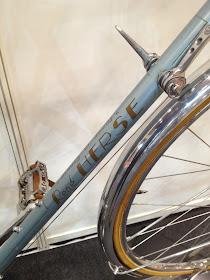But after missing it for a few years, and getting more interested in "the industry", I thought I should attend.
This year Trek, Giant and Specialized were noticeably absent, though Pinarello, Colnago, Chesini, De Rosa and other Italian brands were there. Cervelo had a small display. Shimano was there, of course, and Campy Japan. I did not see SRAM. Presumably whether someone participates has a lot to do with the specific importer/distributor relationships and whether companies feel they can avoid the show without it damaging their business and prospects. It is a "command performance" for major Japanese brands, and for some others trying to expand here.
There were a few highlights for me.
1. Chesini. Of course, stopping by the Chesini booth, to see Hiroshi Koyama, and also meet Mr. Chesini and his daughter (in law?) visiting from Verona. Hiroshi has been actively promoting the Chesini brand in Japan via C Speed. It is a small brand, but has a long history, back to 1925, and its bikes have some world championship victories to their credit. Chesini is to Verona what Sambi is to Ravenna? But more so.
2. Gokiso Hubs. Are these the best hubs in existence? Tim Smith (GS Astuto) and David Marx (RGT Enterprises) are big fans, and they come highly reviewed. As I was leaving, I saw Tim Smith just entering the show. He was headed over to say hello to Kondo-san at Gokiso. David Marx was home in Nagoya, but told me he loves his Gokiso hubs and that I should check them out.
At the well-manned booth, I was given a demonstration of how perfectly balanced and responsive a wheel can be -- to the point where adding a plastic valve cap would be enough weight to start the wheel rotating. And they explained how the hubs are designed to avoid damage to the internals, especially the bearings, in both installation and with a suspension to protect from impacts while riding. They start with ball bearings designed for aerospace applications.
But the cost is a bit much for a mere mortal like me (around $3000 for a set retail). Great for a show bike, or for Alberto Contador. Difficult for me to justify. And as my instructor said at my UBI framebuilding course in February, "we are not flying these things to the moon" ... Bicycles really do not require aerospace precision.
3. Randonneur bikes at Grand Bois. I must be getting older. Or maybe it is just that I have lost what remained of my interest in bike racing following the Lance Armstrong USADA report. Instead of checking out the latest racing models from Pinarello and the latest in carbon deep wheels, I found myself drawn to the Grand Bois booth. Grand Bois is a brand of classic and retro bikes and components developed by I's Bicycles in Kyoto. I think Jan Heine/Compass Bikes handle their products in the U.S. They had a classic Rene Herse bike from way back (1950s?) on display.
 |
| Grand Bois hubs -- retro styling, but modern internals and the convenience of QR skewers. |
 |
| Strida, the only belt drive model I saw ... though there were probably more. (You need a monostay, like this, or a notch in one side of the seat stays, to fit a belt drive onto a bike). A UK brand, apparently. |
 |
| Vanmoof bike with Philips front and rear lights integrated in the top tube. Internal gear Sturmey Archer rear hub. Dynamo front hub, both with drum brakes. |
5. Handmade bicycles. Cycle Mode now has a special area for framebuilders, and around 8 to 10 of them had their wares on display. There was also a stage set up for a presentation by the builders. Of courser, Cherubim had a display. It was not crowded, so I took the chance to say hello to Shin-ichi Konno, one of the most celebrated framebuilders of his generation and winner of the NAHBS "best in show" award twice in recent years. And there was a display for a new vocational school -- Tokyo College of Cycle Design, that opened this year.
 |
| Cherubim's take on the classic racer. With a more modern tandem below. |
 |
| Konno-san and the NAHBS winning bike, plus some beautiful lugs on the headtubes/fork crowns in the foreground. |
 |
| The stem on Cherubim's sleek, modern version of a racer. Nothing but Campy in the entire booth. |
 |
| The distinctive Nagasawa logo ... Blogger seems to want to show it upside down. |
 |
| Etching on Yuka Kitajima's steel framed pizza picnic bike. |
 |
| Spare spoke fits inside the fender attachment. |



Thanks for the Cycle Mode review. Do you happen to know if the handbuilt custom component of the show is growing? The Tokyo College of Cycle Design would seem a natural primer for this part of the show hall, even though several of the graduates get jobs with mass-producers in the bike industry.
ReplyDeleteI am afraid I do not know.
ReplyDeleteCycle Mode continues to target newbies for the most part ... so not sure if they have succeeded with or grown the handmade segment. ...
It seems that the "Tokyo hand made bike show" has exited cycle mode and became an independent event. Unfortunately you have just missed it, it was held on Jan. 23-24 at the bicycle culture centre in the science museum close to Kudanshita station.
ReplyDeletehttp://www.cycle-info.bpaj.or.jp/?tid=100234
If east Asia now has a handmade custom bicycle show, that's big news for the artisan sector. First North America, then Europe (Bespoked) and now Asia. I will have to make sure I get to Tokyo for the 2017 show.
ReplyDelete